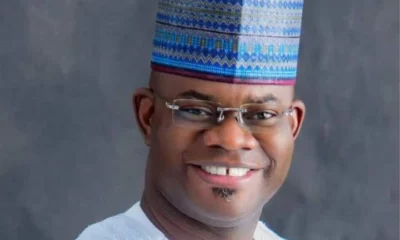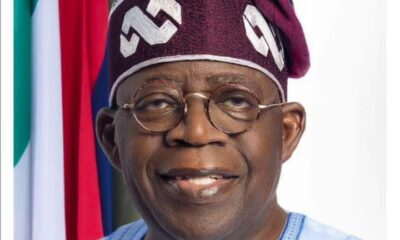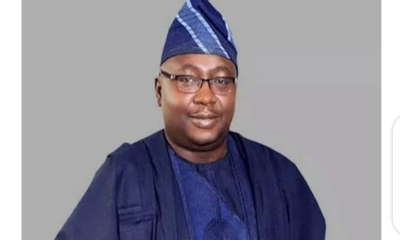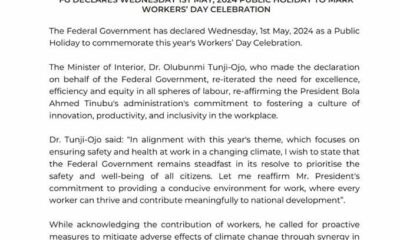News
Nigerian scientist develops 1st global AI platform for translation


BY: NAN
Mr. Emmanuel Gabriel, a 41-year-old Nigerian Information Communication Technology (ICT) expert, has developed a global Artificial Intelligence (AI) platform, known as ‘OBTranslate’, for over 2,000 African language translation.
Gabriel, based in Germany, told the News Agency of Nigeria (NAN) in email on Wednesday in Abuja that the invention, being the first globally, was intended to create massive jobs for Africans.
According to him, OBTranslate is an online Common Admission Tool (CAT) for machine learning, AI platforms and neural network systems for over 2,000 African languages.
He explained that the drive to expand the Nigerian, African ICT market, create jobs and help improve lives of people motivated him to come up with the innovation.
“After the launch of OBTranslate, I hope it will break communication barriers in Africa and create job opportunities for people.
“Farmers will be able to trade their goods and services without language communication barriers.
“OBTranslate machine language, AI algorithms have curated over nine billion accurate tasks, to be translated in over 2,000 African languages which are available in our neural network connections.
“Our goal is to break language communication barriers in rural and urban areas in Africa and it will enable self-driving cars, smartphones, linear robots and wireless technology to communicate and interact with Africans in their dialects,” he said.
The scientist added that the OBTranslate technology was built on machine learning, AI and big data analysis which identified language patterns and tasks.
Gabriel pointed out that the tasks of deep machine learning include voice recognition and accent, messaging protocol, African-based programming languages, natural language processing, education materials and television subtitles and music lyrics, among others.
He noted that there were over 2,000 languages in 54 countries of Africa, whereby 63 per cent of the total sub-Saharan population live in rural areas and speaking diverse dialects.
According to him, there are more than 854 million people living in sub-Saharan Africa in rural areas without access to global markets, while 37 per cent live in urban areas.
He said “there are over 52 native languages in Africa, which have undergone language death, they have no native speakers and no spoken descendants.”
The expert also said that the invention had the capacity to create jobs for 100 million Africans who had the capacity to teach their machine Pidgin English or their native languages.
“Our machine language, AI algorithms with neural network connections have curated billions of task waiting for Africans who can teach our machine their local dialect.
“The first phase of the project comes with nine billion tasks, and the second phase comes with 12 billion tasks. “It is projected to hire about 100 million Africans, with a projection of 3.6 billion USD passive income for Africans with the capacity,” said Gabriel.
He called on African countries to ensure job creation and the implementation of the structural adjustment policies recommended by the World Bank and International Monetary Fund.
According to him, most people who migrate to other countries are pushed by war, poverty and other security concerns in their countries.
NAN also reports that the Ishan-born expert from Edo state, studied ICT and Robotics in India and began computing at the age of 18 when he built his first software to analyse petroleum crude oil seismic data.
Gabriel was the founder of OpenBinacle, an Europe-Africa based technology company, while OBTranslate was a registered trademark and patent of its parent company OpenBinacle. (NAN)
News
Nigerians Seek Woman Who Spoke Out Eloquently Against Fuel Scarcity In Viral 1994 TV Clip


April 30th 1994, 30 Years Ago, And Till Today Nothing Has Really Changed.
Netizens have gone in search of a beautiful and well-spoken woman who spoke out against fuel scarcity 30 Years Ago.
A user on X.com, Jackie, who identifies as #JWEZEE had shared the video yesterday with the caption, “On this day April 30 1994, same day same time, only difference 30years ago.
“Nigerians in long fuel queues lamenting, 30years later they are still lamenting. And In another 30years will still lament, why? Because patterns don’t lie.”
In the video, which has since gone viral, Nigerians were seen queuing to purchase fuel and lamenting their predicament as citizens waiting in long queues with their gallons to buy fuel.
The woman passionately addressed the unfairness of soldiers skipping queues to resell fuel, highlighting a longstanding problem.
She said in part, “You have the soldiers that come, they buy petrol, they put it in jerry cans they sell it right in front of these people, it’s ridiculous.
“They get the fuel themselves, why do they have to come here, they don’t join the queue, they just buy and they sell right in front of people, it’s ridiculous. Something has to happen.”
The 30-year-old video which recently surfaced coincides with the current fuel price hike across the country.
Here is the viral video from 30 years back.
Currently, the country is facing fuel scarcity and price hike, with fuel being sold at N900 per litre in some states. This has affected the price of goods in the nation.
News
FG Declares May 1st Public Holiday To Mark Workers’ Day


The Federal Government had declared Wednesday, May 1st, 2024, as a public holiday to mark this year’s Workers’ Day.
Nigeria’s Minister of Interior Olubunmi Tunji-Ojo made the declaration, according to the ministry’s Permanent Secretary Aishetu Ndayako.
“The Federal Government has declared Wednesday, 1st May 2024 as a Public Holiday to commemorate this year’s Workers’ Day Celebration,” Aishetu said in a statement on Tuesday, April 30.
“In alignment with this year’s theme, which focuses on ensuring safety and health at work in a changing climate, I wish to state that the Federal Government remains steadfast in its resolve to prioritise the safety and well-being of all citizens,” the minister said.
“Let me reaffirm Mr. President’s commitment to providing a conducive environment for work, where every worker can thrive and contribute meaningfully to national development”.
The minister, who acknowledged the contribution of workers, called for more measures to mitigate the adverse effects of climate change through synergy.
“The Minister also urged Nigerians to remain committed to the present administration’s Renewed Hope Agenda as he wishes workers a happy celebration,” the statement read.
News
“There Would Be total Blackout For Three Months If Electricity Tariff Hike Is Not Implemented ” – Minister Of Power Warns


The Minister of Power, Adebayo Adelabu, has warned that there would be a total blackout in the country in the next three months if the proposed electricity tariff hike is not implemented.
The minister gave the warning in Abuja when he appeared before the Senate Committee on Power at an investigative hearing over the recent electricity tariff hike by the Nigerian Electricity Regulatory Commission (NERC)on Monday, April 29.
In his words
“The entire sector will be grounded if we don’t increase the tariff. With what we have now in the next three months, the entire country will be in darkness if we don’t increase tariffs. The increment will catapult us to the next level. We are also Nigerians, we are also feeling the impact.”
He said the sum of $10 billion is needed yearly for the next ten years to revive the nation’s power sector and nip in the bud the challenges bedevilling it.
“For this sector to be revived, the government needs to spend nothing less than 10 billion dollars annually in the next 10 years.
“This is because of the infrastructure requirement for the stability of the sector. But the government cannot afford that. And so we must make this sector attractive to investors and to lenders. So, for us to attract investors and investment, we must make the sector attractive, and the only way it can be made attractive is that there must be commercial pricing.
“If the value is still at N66 and the government is not paying subsidy, the investors will not come. But now that we have increased the tariff for A Band, there are interests being shown by investors,” he said.
Adelabu said the inability of the government to pay outstanding N2.9 trillion subsidy was due to limited resources, hence the need to evolve measures to sustain the sector.
-



 News5 days ago
News5 days agoKing Charles Reportedly “Really Unwell” And Funeral Plans Are Currently Being Reviewed
-



 Entertainment5 days ago
Entertainment5 days agoBig Congratulations To BBNaija Star, Miracle Igbokwe Who Graduated With Distinction From Embry-Riddle Aeronautical University In Florida USA
-



 Finance5 days ago
Finance5 days agoAISA Has Refunded The Fees Paid By Yahaya Bello To EFCC
-



 Politics3 days ago
Politics3 days ago“Fuel Subsidy Removal Was A Necessary Action To Prevent Nigeria From Going Bankrupt” – President Tinubu
-



 News2 days ago
News2 days agoFuel Price Skyrockets To ₦1000 Per Litre In Some States As Scarcity Sets In
-



 News2 days ago
News2 days ago“There Would Be total Blackout For Three Months If Electricity Tariff Hike Is Not Implemented ” – Minister Of Power Warns
-



 News1 day ago
News1 day agoFG Declares May 1st Public Holiday To Mark Workers’ Day
-



 News13 hours ago
News13 hours agoNigerians Seek Woman Who Spoke Out Eloquently Against Fuel Scarcity In Viral 1994 TV Clip






